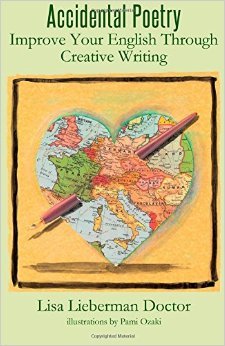Writing From The Heart While Learning English: Why New Speakers of English Are So Enthusiastic About It
Lisa Lieberman Doctor, US
Lisa Doctor has been working with writers in Los Angeles since 1977. Over the years she has served as: a development and production executive, including VP of Robin Williams’ company, Blue Wolf Productions; a staff writer on General Hospital, where she was nominated for a Daytime Emmy and Writers Guild Award; an expert witness in motion picture copyright law; and a writing instructor at many universities and organizations, including the UCLA Writers Program. Contact Lisa at www.lisadoctor.com

As a former movie executive in Los Angeles and now an instructor for novelists and screenwriters, I’ve developed hundreds of exercises to help writers find a deep connection to their fictional characters. I might ask them, “When have you grasped for hope, only to have it elude you?” or “When have you recognized anger, and then allowed it to evaporate?” The many writers I’ve worked with over the years have found these exercises helpful not only as a way to define their characters, but also as a tool for their own personal evolution.
A decade ago, I was invited to teach grammar and idioms to new English speakers at the University of the Balearic Islands in Mallorca, Spain, and had a revelatory thought: what if I were to use the exercises, designed for authors, as a way of improving language skills? It was an unconventional approach to language learning, but surely worth a try. My first group of students were undergraduates, some of whom had less than a hundred words in their English vocabulary. I instructed them to respond to the exercises without fear of grammatical correctness; after all, communication isn’t about perfection, it’s about sharing our thoughts and feelings. The results exceeded mine and their expectations; they had never written creatively in another language before, and once they began responding to the prompts, they didn’t want to stop. I was invited back to Mallorca several times to continue the process, not only with students but with their instructors, too. Again and again, the results were profoundly satisfying to me and to the new speakers in the room. There were tears and laughter and genuine bonding as the students revealed their thoughts and feelings with confidence. And the great gift to me, in addition to watching them improve their skills, was learning about their culture more than I could in any travel book. They wrote about their villages, their family, their romantic relationships, their concerns for the future of the island and for their own futures as well.
I continued working with new speakers of English in other foreign locales, and always with the same exciting results. Why have they been so enthusiastic? The answer is obvious to me. When we write from the heart without the fear of “getting it wrong,” we experience a sense of freedom that is exhilarating. Great joy comes from this expression, and from seeing first-hand that others in the room are moved by our words. Knowing that others empathize with our experiences, that they are us and we are them, increases our own sense of self-worth. Our words matter. We are understood. It’s a universal need that we humans have, and it can be achieved through written expression.
To my delight, many of my original students in Mallorca have kept in touch, and they often tell me that their first experience of writing from the heart has shaped them in their adult lives. One of my gifted students, Raquel Gelabert, a poet and an English language teacher herself, recently said this about her experience in our classroom a decade ago, where she and her classmates were encouraged to write from the heart: “…We shattered the impenetrable wall that lay between our inner selves and expression; a painful pause embodied in a blank sheet of paper. We demolished the stone wall between the apprentice and the instructor. We had no fear of being judged in the friendly atmosphere where we were all comfortable and ready to share and learn from one another. We laid our hearts in our hands, humbled and eager to experience the magic of words unlimited. I remember feeling restless, my heart beating to write, experiencing the need to say it all, devoid of peril. After we finished writing, we became readers of our own creation, feeling special and capable. We never felt intimidated or fearful of having failed in some way, but rather privileged to find an opportunity for growth.” Raquel goes on to say, “As an English teacher, I work to make classes a place for experimentation, where there are no hurdles and where one is not afraid of making mistakes both in speaking and writing; a space in which I myself blend with my students and learn from them.”
This is the essence of my work with new English speakers, to help them feel comfortable with their self-expression, to encourage them to let go of the need to be perfect—an illusive and impossible conceit—and to communicate from the heart. As much as I love my work here in Los Angeles with novelists and screenwriters, this additional calling that I’ve discovered has been deeply enriching and exciting.
After many years of reluctance to put the exercises into a book—I hesitated, unable to imagine not being present for each and every response—I have created “Accidental Poetry: Improve Your English Through Creative Writing.” The slim volume of 237 writing exercises is designed for use in the classroom and also with individuals who would like to improve their English language skills by writing from the heart. I encourage new speakers of English to try it, and experience the freedom of writing without the fear of “getting it wrong.”

Please check the Creative Methodology for the Classroom course at Pilgrims website.


|